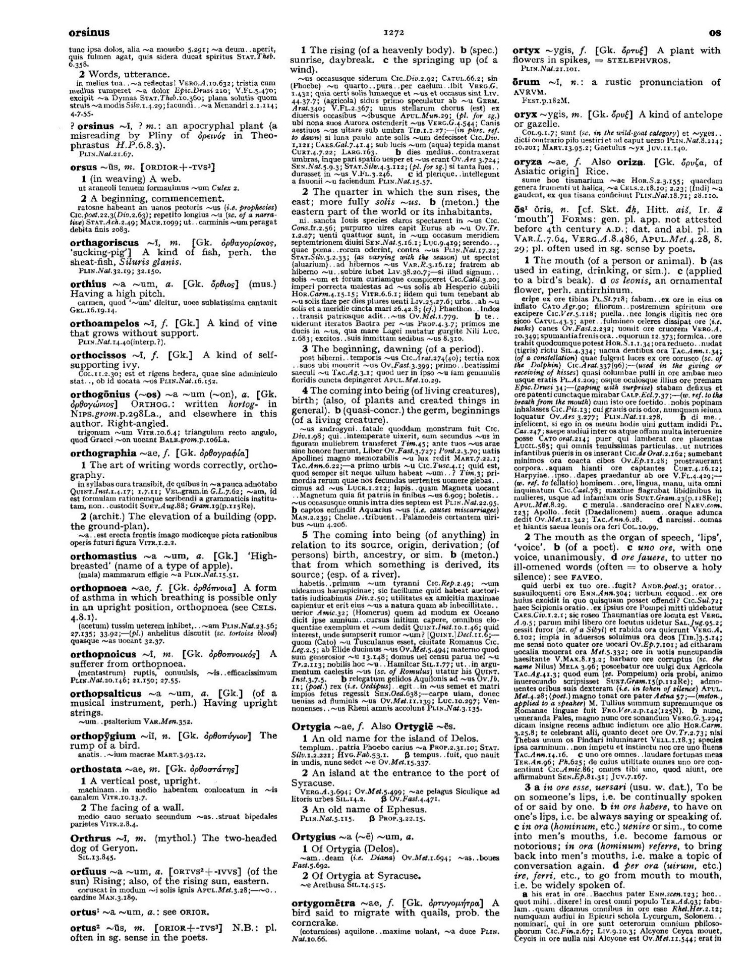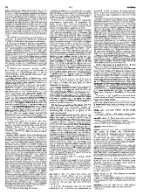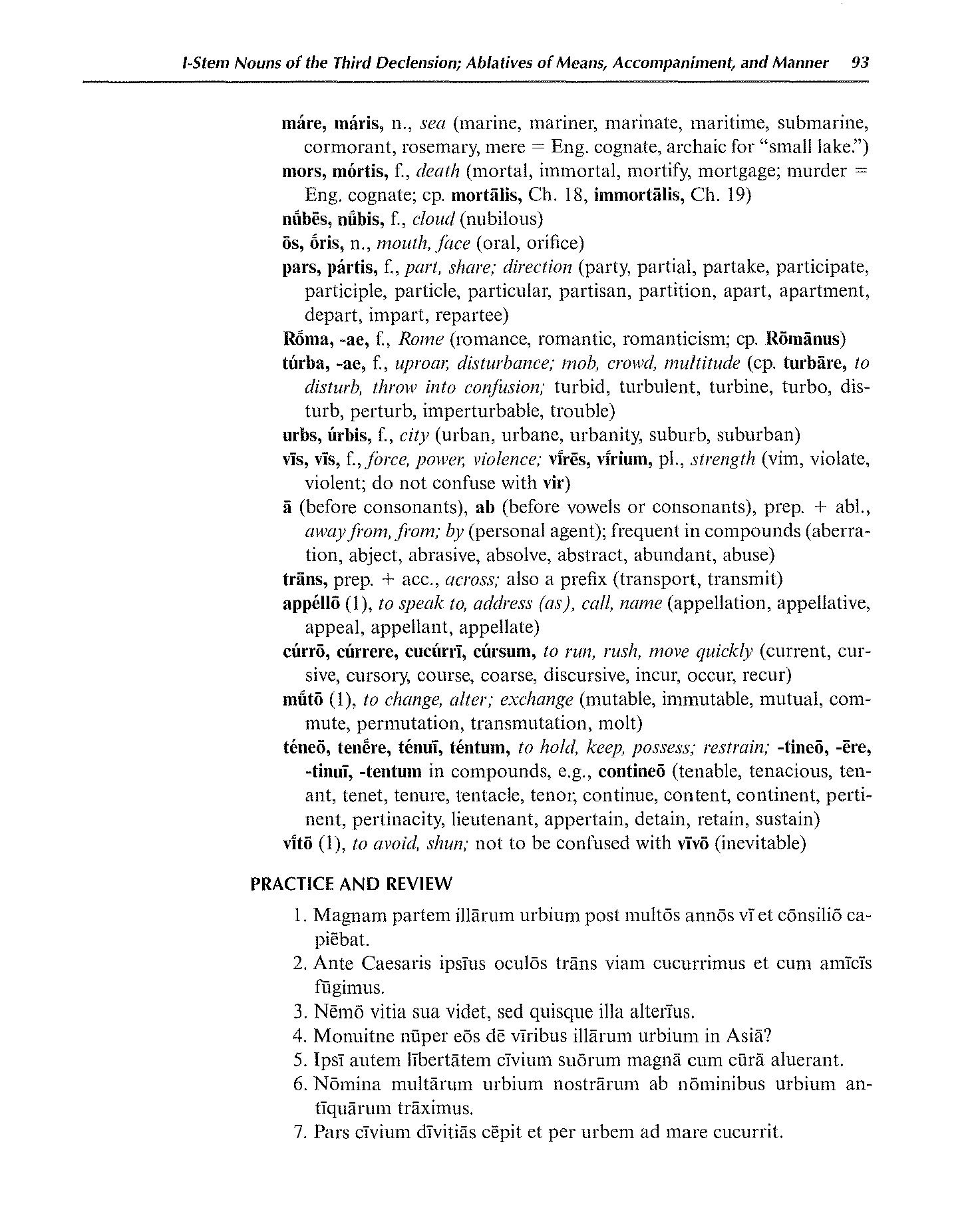
page_listing.tpl
page_subListingDetails.tpl
sub_listingDetails_style1.tpl
sub_listingDetails.title.tpl
ōs mouth
ōs is a Latin Noun that primarily means mouth.
Definitions for ōs
Wheelock's Latin
Noun
- 1
mouth, face
English derivatives:
oral orifice
Oxford Latin Dictionary
Noun
- 1
The mouth (of a person or animal). (b) (as used in eating, drinking, or sim.). (c) (applied to a bird's beak). (d) an ornamental flower, perh. antirrhinum.
- 2
The mouth as the organ of speech, 'lips', 'voice'. (b) (of a poet). (c) with one voice, unanimously. (d) to utter no ill-omened words (often = to observe a holy silence): see FAVEO.
- 3
(a) (usu. w. dat.), To be on someone's lips, i.e. to be continually spoken of or said by one. (b) to have one's lips, i.e. be always saying or speaking of. (c) to come into men's mouths, i.e. become famous or notorious; to bring back into men's mouths, i.e. make a topic of conversation again. (d) to go from mouth to mouth, i.e. be widely spoken of.
Sentences with ōs
Latin to English
Quaque patet domitis Romana potentia terris, ore legar populi, perque omnia saecula fama, siquid habent veri vatum praesagia, vivam.Compare Wherever Rome's power extend overs the conquered world, I shall have mention on men's lips, and if the prophecies of bards have any truth, through all the ages shall I live in fame.
Ut natura dedit, sic omnis recta figura est: turpis Romano Belgicus ore color.Compare As nature made it, every face is right; Belgian rouge disgraces Roman cheeks.
Os homine sublime dedit, caelumque tueri iussit et erectos ad sidera tollere vultus.Compare He gave to man an uplifted face and bade him stand erect and turn his eyes to heaven.
Video, Patres conscriptus, in ego omnis os atque oculus converto.Compare I see, conscript Fathers, that the faces and eyes of all are turned on me.
Corpus, os, vestitus civis agnosco.Compare I recognise the persons, the faces, the dress of citizens.
Declension table for ōs
Cactus2000
| Singular | Plural | |
| Nom. | ōs | ōra |
| Gen. | ōris | ōrum |
| Dat. | ōrī | ōribus |
| Acc. | ōs | ōra |
| Abl. | ōre | ōribus |
Data sources
Notes
- Definitions
- Frederick M. Wheelock, Wheelock's Latin, 6th ed., rev. Richard A. LaFleur (New York, NY: HarperCollins Publishers, 2005): 93.
- P. G. W. Glare, Oxford Latin Dictionary, Vols. 1-8 (Oxford: Clarendon Press, 1982): 1272.
- Word frequencies
- Christopher Francese, "Latin Core Vocabulary," Dickinson College Commentaries, last modified 2014, http://dcc.dickinson.edu.
- Paul B. Diederich, The Frequency of Latin Words and Their Endings, PhD diss., (Columbia University, 1939).
- Louis Delatte, Suzanne Govaerts, Joseph Denooz, and Etienne Evrard, Dictionnaire fréquentiel et index inverse de la langue latine [Frequency Dictionary and Inverse Index of the Latin Language] (Liège, Belgium: Laboratoire d'analyse statistique des langues anciennes de l'Université de Liège [L.A.S.L.A.], 1981): 120.
Bibliography
Allen, Joseph H. Allen and Greenough's New Latin Grammar for Schools and Colleges: Founded on Comparative Grammar. Edited by James B. Greenough, George L. Kittredge, Albert A. Howard, and Benjamin L. D'Ooge. Boston, MA: Ginn & Company, 1903.
Crystal, David. A Dictionary of Linguistics and Phonetics. 6th ed. Oxford, UK: Blackwell Publishing, 2008.
Delatte, Louis, Suzanne Govaerts, Joseph Denooz, and Etienne Evrard. Dictionnaire fréquentiel et index inverse de la langue latine [Frequency Dictionary and Inverse Index of the Latin Language]. Liège, Belgium: Laboratoire d'analyse statistique des langues anciennes de l'Université de Liège (L.A.S.L.A.), 1981.
Diederich, Paul B. The Frequency of Latin Words and Their Endings. PhD diss., Columbia University, 1939.
Francese, Christopher. "Latin Core Vocabulary." Dickinson College Commentaries. Last modified 2014. http://dcc.dickinson.edu/latin-vocabulary-list.
Gildersleeve, Basil L., and Gonzales Lodge. Gildersleeve's Latin Grammar: Third Edition, Revised, and Enlarged. 3rd ed. London, England: Macmillan and Co., 1903.
Glare, Peter G.W. Oxford Latin Dictionary. Vols. 1-8. Oxford, England: Clarendon Press, 1982.
Krüger, Bernd. "Latin Conjugation Tables." Cactus2000. Accessed May 5, 2023. https://latin.cactus2000.de/index.en.php.
Pierson, Nick. "Sound of Text." Accessed October 26, 2019. https://soundoftext.com.
Wheelock, Frederick M. Wheelock's Latin. 6th ed. Revised by Richard A. LaFleur. New York, NY: HarperCollins Publishers, 2005.
Wiktionary Contributors. "Victionarium." Wikimedia Foundation, Inc. Updated March 18, 2019. https://la.wiktionary.org/wiki/Victionarium:Pagina_prima.
Citation
Chicago (17th ed.)
Allo Contributors. "ōs, ōris (n.) - Latin Word Definition." Allo Latin Dictionary. Last modified . Accessed February 12, 2026. http://ancientlanguages.org/latin/dictionary/os-oris.
Entry created on . Last updated on .








